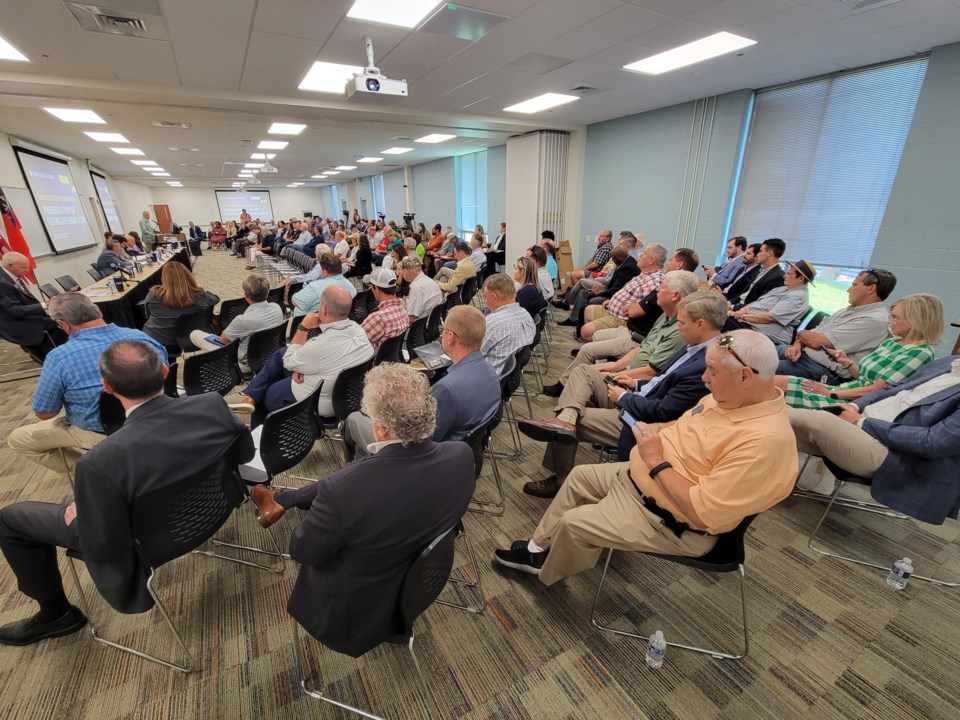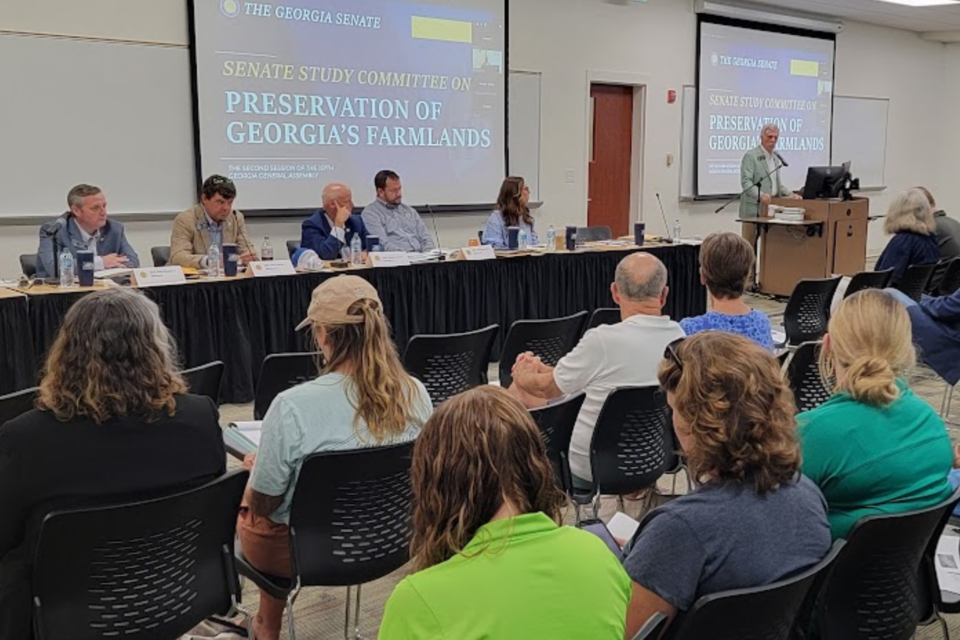The Senate Study Committee on Preservation of Farmlands Chaired by Statesboro Senator Billy Hickman, held their first meeting on Tuesday, July 30, 2024 at the Georgia Southern University Center for Continuing Education, addressing the issue of preserving Georgia's valuable agricultural lands. During the three-hour meeting, six speakers highlighted the importance of agriculture to Georgia's economy and proposed innovative solutions to ensure its future viability.
Click here to view the live stream of the meeting and slide presentations presented during the meeting.
"Our purpose here is significant. Last night, I pulled this from Senate Resolution 174: 'The Senate shall evaluate farmland protection efforts implemented in other agricultural states and seek the advice of experts in agricultural economics, tax policy, land management, economic and environmental law and policy, and other relevant fields to consider additional measures necessary and appropriate for Georgia.' These are strong words and reflect our intentional focus," said Senator Hickman as he opened the meeting.
Senator Hickman then provided an update on the committee's upcoming meetings. "We will be meeting on August 30th in Cornelia, Georgia. On September 25th, we will gather in Senator Watson's area of Moultrie, Georgia. October 28th will see us in Cedartown, Georgia, at the Cedartown High School and College and Career Academy. Finally, in November, we will meet at the Cowboy in Noble, Georgia. Shortly after these meetings, we will draft our report."

Senator Hickman introduced the senate committee, which includes, in addition to Senator Hickman:
- Senator Jason Anavitarte
- Senator Brandon Beach
- Senator Jason Esteves
- Senator Russ Goodmen
- Senator Freddie Powell Sims
- Senator Sam Watson
He then introduced the first speaker Dr. Kyle Marrero.
Dr. Kyle Marrero, President of Georgia Southern University, warmly welcomed the committee to Statesboro. He emphasized the university's commitment to supporting regional agriculture through research and education. Dr. Marrero proudly shared Georgia Southern's advancements in agricultural practices and environmental sustainability, including innovative irrigation techniques and soil nutrient analysis.
Katherine Moore, President of Georgia Conservancy, Inc., presented a comprehensive analysis of land cover changes in Georgia over the past 50 years. She highlighted the significant loss of agricultural land due to low-intensity development and emphasized the need for intentional land use decisions to protect the state's top industries, including agriculture and forestry. Moore stressed the importance of proactive conservation efforts and the integration of housing solutions with land preservation.
Dr. Asli Aslan, Director of the Georgia Southern University Institute for Water and Health, discussed the institute's efforts to address water-related challenges in agriculture. She highlighted the Safe Water Together program, funded by a $2 million grant from the US Congress, which aims to work with communities to understand and solve water issues. Dr. Aslan emphasized the importance of community involvement and innovative solutions like microbial source tracking and algae-based water treatment.
Heidi Jeffers, Director of the Georgia Grown Innovation Center, shared the center's mission to support agricultural producers and foster collaboration among various stakeholders. She discussed the center's successful initiatives, including workshops, panel discussions, and personalized support for farmers and agribusinesses. Jeffers highlighted the center's role in promoting Georgia-grown products and facilitating economic growth in the agricultural sector.
Grant Anderson, Founder of Better Fresh Farms, discussed the potential of controlled environment agriculture in Georgia. Anderson shared his journey into hydroponic farming and the success of Better Fresh Farms in producing high-quality leafy greens with minimal water and space. He emphasized the need for local production to reduce dependence on out-of-state supplies and highlighted the economic and environmental benefits of innovative agricultural practices. Anderson's efforts, supported by various partnerships and grants, demonstrate the potential for alternative agricultural methods to supplement traditional farming and contribute to Georgia's food sovereignty.
Bill Worthington, an Agribusiness Teacher at Ogeechee Technical College, spoke about the importance of education and training in agriculture. He detailed the college's efforts to equip students with practical skills and knowledge to succeed in the agriculture industry. Worthington emphasized the significance of hands-on experience and the availability of scholarships to support students pursuing careers in agriculture.
Tyler Harper, Commissioner of the Georgia Department of Agriculture, underscored the critical role of agriculture in Georgia's economy. He highlighted the challenges facing farmers, including labor issues, mental health concerns, and the loss of viable farmland. Harper called for smart agricultural policies, conservation programs, and innovative solutions to ensure the success and sustainability of Georgia's agriculture industry.
The session concluded with public comments, providing community members an opportunity to voice their concerns and suggestions regarding farmland preservation. The diverse group of eight speakers and the valuable insights shared during the public comments underscored the importance of collaborative efforts in preserving Georgia's agricultural heritage and securing its future prosperity.




